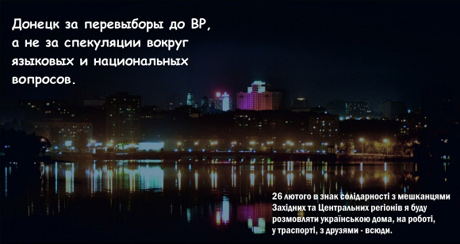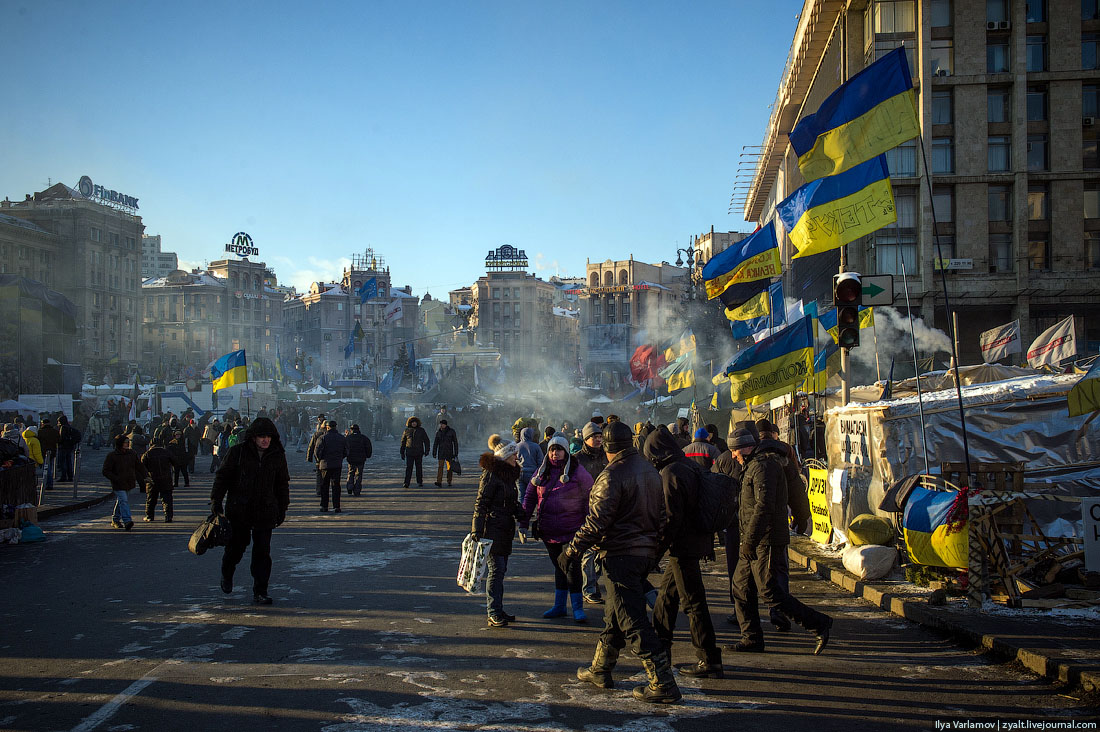The new Ukrainian government that took the scene after Yanukovych fled repealed the controversial language law adopted on July 3, 2012 (adopted with multiple violations of the voting procedure). The law granted the Russian language the de-facto status of a second state language on a backdrop of withering opportunities for the Ukrainian language, oppressed througout the long history of Ukraine’s russification in the times of the Russian Empire and Soviet Union. This was a cause for unrest in the predominantly Russian-speaking Eastern and Southern regions, where calls for separatism have not been uncommon recently, not without the help of Russian propaganda and specific politicians. Speculating on the issue of language is an old trick that the Ukrainian authorities have learned to raise around the time of elections. It seems Ukrainians have finally recognised the true reasons for “language games”. The more the different regions hate one another and the more they are afraid of each other, the less unified they are against their common enemy – corrupt officials and oligarchs that steal money. On February 26, the Ukrainian-speaking Western city of Lviv declared that its residents would be speaking Russian in solidarity with the Russian-speaking population of Ukraine’s Eastern and Southern regions.

Now, language should not be the issue of the day!
Lviv wants reelections to the Parliament, and not speculating on language and nationality!
On February 26, I will speak Russian at home, at work, with my friends – everywhere, in solidarity with the residents of Southern and Eastern regions of Ukraine.
The statement, circulating in FB:
“On February 26, I, a Lviv resident, will be speaking in Russian.
We, the residents of Lviv, would like to address the residents of Ukraine’s East and South with the words of gratitude for their support in the struggle against criminal government. We stood together on the barricades, we are mourning the fallen together, and we want to build the new Ukraine together.
We address you in Russian, first and foremost, because it is important for us to support you now in the struggle that is still going in in Luhansk, Crimea, Dnipropetrovsk, Kherson, and Odesa. And also because certain political forces are trying to speculate on the language issue in Ukraine, despite the already complex and tense situation. We do not wish, as the residents of Western Ukraine, to be associated with the radical statements of Svoboda representatives – as this party’s ideology is far from enjoying the total support amongst everyone in Lviv, Ivano-Frankivsk, or Ternopil.
We have no intention of forcing the Ukrainian language on everyone, and we have even less of an intention of infringing the rights of the Russian-speaking population in the East and South of Ukraine. Lviv and its residents have always shown hospitality to people of all ethnicities, and everyone who has ever visited here can prove this. Historically, we have been and remain a multicultural center, and we do not exalt any “titular nations.” The rights of every human being, irrespective of ethnicity or language, everyone’s honor and dignity – this is the reason why we stood on Maidan and are continuing to stand.
As a result of its provocative and questionable actions and statements, Svoboda has been rapidly losing the society’s support lately, and we hope that the upcoming elections and lustration of government will put everything in its places. Just like you, we are interested in a total reload of the system of power, rather than in replacement of faces in key positions.
That is why we would like to express our solidarity to you and are asking you to please not judge the entire Western Ukraine on the basis of statements of individual controversial politicians. Lately, Lviv has been diligently trying to develop relations with various towns in Eastern Ukraine, and we will continue this work on all possible levels.
There have been numerous attempts to set the East and the West against each other in the years since Ukraine’s independence. Yet we are confident that our people are wiser than any politicians. And we have proven time and again that it is easy for us to come to mutual consent – once the politicians leave us alone.”
The Russian-speaking cities of Donetsk and Odesa were quick to follow.

On February 26, I will speak Ukrainian at home, at work, with my friends – everywhere, in solidarity with the residents of the Central and Western regions of Ukraine.

On February 27, I will speak Ukrainian at home, at work, with my friends – everywhere, in solidarity with the residents of the Central and Western regions of Ukraine.
A statement of Ukrainians living in Donetsk was widely circulating in Vkontakte:
“On February 26, I, a Donetsk resident, will speak Ukrainian.
It is on this day that a flashmob will be held in Lviv, aiming to show to the parliament and to residents of the Eastern and Southern regions, that political actions have nothing in common with the real desires of the Ukrainian people. So on February 26, Lviv, the Lion’s city, will switch to Russian.
We, residents of Donetsk, want to express our support for the development of civil society in Ukraine, and in solidarity with the residents of the western and central regions of Ukraine on February 26 we will speak Ukrainian at home, at work, in transport, with friends – everywhere.
We appeal to the inhabitants of the western and central regions. Do not condemn us. We are hostages to many external factors: misinformation, “Goebbels’” propaganda, concept misinterpretation, irresponsibility of separate officials and politicians, criminal pressure. We have many fronts to fight on. It’s not easy. And it makes it even harder when our brothers from the West compare us all to “cattle” and “bandits”. We are not like that! Yes, we have enough representatives of the human race that we are not proud of, and we ourselves call them bandits and cattle. But show me a place that doesn’t have them?
The people of eastern Ukraine are kind, simple, and strong descendants of the Cossacks, but they were always forced and are still being forced to not remember this. It’s not easy for us. But we are fighting, and we will overcome!
Do not look at all of us through the “Party of Regions” prism and its representatives. The population of our region is still being manipulated, but this phenomenon is coming to an end. We need time and understanding.
The importance of the Russian language in our region is exaggerated, because as soon as you drive 5 kilometers away from any large city, you will hear the Ukrainian language. In our oblasts’ villages and small towns they speak Ukrainian. Not literary Ukrainian, they use Russian words, but are there no influences of the neighboring countries’ languages on the spoken Ukrainian language in the villages of Western Ukraine? And all of this is fine.
We appeal to the our fellow Ukrainian citizens in the Eastern and Southern regions. Maidan is in all of us. Every time one of us is confronted with lawlessness, bribery, unfair courts and injustice, when you wonder how much more of it you can tolerate, – this is Maidan. Maidan never stood for any sole person, and neither did it stand for somebody’s money. Maidan will not permit political games, will neither allow Tymoshenko to return, nor will it allow dictatorship. Do not believe the rumors about the gang of “Bandera” and millions of our fellow citizens being paid to stand on Maidan. Maidan are the people of Ukraine. People such as you and me.
Do not believe the intrigues going on with questions of state language language and federalization. All of this is being done for the sake of power over us. But we are not like that! Is not so?
Do not believe the rumors that someone is going to kill us or do anything of the like. We are citizens of the same country, and we will not be figures in the hands of puppeteers. Believe your heart, believe your brethren, believe each other.
Our goal is to show the whole country, and especially the politicians, that we will not allow political games against the background of the sad and difficult days of our history. We will prove that the people of Ukraine, regardless of the language they speak, their nationality, or place of residence – they are free, friendly people who “will not yield” to political games. We will prove that neither the East nor the West will be split by any politician. No one can manipulate the people of Ukraine! Chivalry and honor – that is our shield from the rotten political system. The East and West hold this shield together. We will begin to listen and communicate with one another, regardless of politicians!
So tomorrow, on February 26, in solidarity with the residents of the western and central regions will I speak Ukrainian at home, at work, in transport, with friends – everywhere.”
It seems that the people of Ukraine are wiser than their politicians. The East and West are together!
Translated by Alya Shandra&Olga Ruda
Edited by James Hydzik





